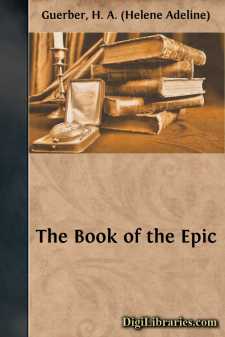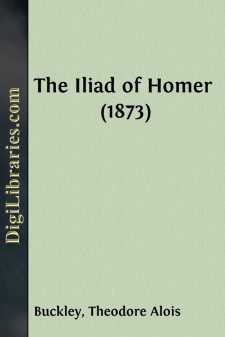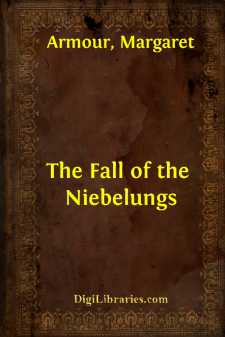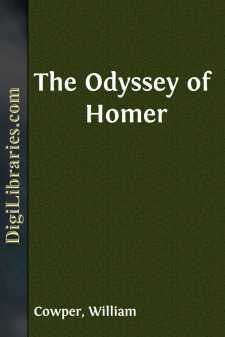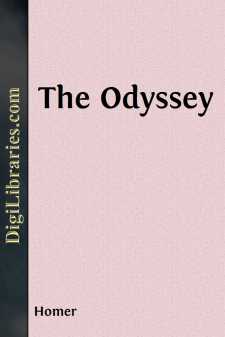Poetry
- American 96
- Ancient, Classical & Medieval
- Asian 15
- Australian & Oceanian 11
- Canadian 11
- Caribbean & Latin American 5
- Children's Poetry & Nursery rhymes 51
- Continental European 11
- English, Irish, Scottish, Welsh 162
- General 483
- Inspirational & Religious 7
- Middle Eastern 3
Ancient, Classical & Medieval Books
Sort by:
1. Origin of the Saga All the Aryan peoples have had their heroic age, the achievements of which form the basis of later saga. For the Germans this was the period of the Migrations, as it is called, in round numbers the two hundred years from 400 to 600, at the close of which we find them settled in those regions which they have, generally speaking, occupied ever since. During these two centuries...
more...
INTRODUCTION Every now and then in our reading we come suddenly face to face with first things,—the very elemental sources beyond which no man may go. There is a distinct satisfaction in dealing with such beginnings, and, when they are those of literature, the sense of freshness is nothing short of inspiring. To share the same lofty outlook, to breathe the same high air with those who first sensed a...
more...
ARGUMENT. Apollo, enraged at the insult offered to his priest, Chryses, sends a pestilence upon the Greeks. A council is called, and Agamemnon, being compelled to restore the daughter of Chryses, whom he had taken from him, in revenge deprives Achilles of Hippodameia. Achilles resigns her, but refuses to aid the Greeks in battle, and at his request, his mother, Thetis, petitions Jove to honour her...
more...
by:
William Cowper
BOOK I. Achilles sing, O Goddess! Peleus' son;His wrath pernicious, who ten thousand woesCaused to Achaia's host, sent many a soulIllustrious into Ades premature,And Heroes gave (so stood the will of Jove)5To dogs and to all ravening fowls a prey,When fierce dispute had separated onceThe noble Chief Achilles from the sonOf Atreus, Agamemnon, King of men. Who them to strife impell'd? What...
more...
by:
Margaret Armour
In old tales they tell us many wonders of heroes and of high courage, of glad feasting, of wine and of mourning; and herein ye shall read of the marvellous deeds and of the strife of brave men. There grew up in Burgundy a noble maiden, in no land was a fairer. Kriemhild was her name. Well favoured was the damsel, and by reason of her died many warriors. Doughty knights in plenty wooed her, as was meet,...
more...
by:
Edward Fairfax
THE ARGUMENT. God sends his angel to Tortosa down, Godfrey unites the Christian Peers and Knights; And all the Lords and Princes of renown Choose him their Duke, to rule the wares and fights. He mustereth all his host, whose number known, He sends them to the fort that Sion hights; The aged tyrant Juda's land that guides, In fear and trouble, to resist provides....
more...
+ANTINOUS+ It rained outside right into Hadrian's soul. The boy lay deadOn the low couch, on whose denuded whole,To Hadrian's eyes, that at their seeing bled,The shadowy light of Death's eclipse was shed. The boy lay dead and the day seemed a nightOutside. The rain fell like a sick affrightOf Nature at her work in killing him.Through the mind's galleries of their past...
more...
by:
William Cowper
ARGUMENT In a council of the Gods, Minerva calls their attention to Ulysses, still a wanderer. They resolve to grant him a safe return to Ithaca. Minerva descends to encourage Telemachus, and in the form of Mentes directs him in what manner to proceed. Throughout this book the extravagance and profligacy of the suitors are occasionally suggested.Muse make the man thy theme, for shrewdness famedAnd...
more...
HOMER'S ODYSSEY. BOOK FIRST—INTRODUCTION. The Odyssey starts by organizing itself; it maps out its own structure in what may be called a General Introduction. Herein lies a significant difference between it and the Iliad, which has simply an Invocation to the Muse, and then leaps into the thick of the action. The Iliad, accordingly, does not formulate its own organization, which fact has been...
more...
by:
Homer
INTRODUCTION Scepticism is as much the result of knowledge, as knowledge is of scepticism. To be content with what we at present know, is, for the most part, to shut our ears against conviction; since, from the very gradual character of our education, we must continually forget, and emancipate ourselves from, knowledge previously acquired; we must set aside old notions and embrace fresh ones; and, as...
more...



